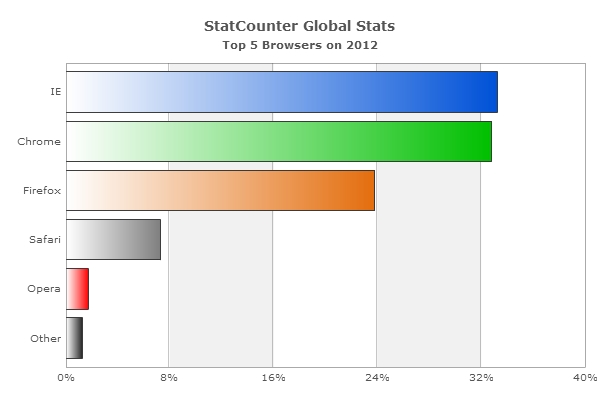
I have good news for you, today’s article will not be Google or Facebook focused… Okay, it might be related, I might mention it once, or twice … maybe more but hey, don’t blame me, they are everywhere!
My concern today is the Do-Not-Track (known as DNT) bill! Said to be focused on protecting web users’ privacy, it is a movement to stop corporate advertisers from tracking the behavior of home computer users, or in other words “prevent the collection of anonymous online user data for ad targeting purposes”.
Tailored so closely to users’ preferences, “third-party behavioral ads” have the highest click-through rates and while they can be effective, they are the most expensive type of online ads.
For those who never heard of behavioral ads, or do not feel concerned, let me remind you what it is exactly.
The Privacy Issue!
To make it simple, it refers to technologies and techniques used by online website publishers andadvertisers which capture data generated by website and landing page visitors.
These techniques allow them to increase the effectiveness of their campaigns, but when done without the knowledge of users, it may be considered as a breach of browser security and illegal by many countries’ privacy, data protection and consumer protection laws.
Here is the point! It is considered illegal by many countries.
Mainly discussed by the U.S Congress, it seems to be more of a U.S issue. Nope, it’s not! The Internet has no borders, and actually Europe’s e-privacy directive gives stronger protections to European personal privacy.
So whos impacted, and how ?
I read that it should strike fear into the hearts of every company that does business online – us – and particularly startups – OH MY GOD, us again ![]() .
.
The more than 100 advertising companies that use third party cookies to place relevant ads for their clients could suffer significant revenue losses. And the most affected websites would be those that have trouble replacing lost revenue from behavioral ads with income from other sources, such as contextual ads. (Julie Cohn , How ‘Do Not Track’ May Hurt Businesses)
Fortunately, we are not advertisers, not doing retargeting, so we won’t be directly impacted.
How does it work ?
Basically it is a way to protect user’s privacy by allowing them to choose how their data is used. The privacy feature lets users opt out of the online tracking conducted by Web sites and advertisers.
When a user enables the Do Not Track feature (if implemented) on the browser, it transmits special information with every HTTP page request, telling the site that the user does not want to be tracked / not to use their browsing history for targeted ads.
So far, the major Internet browsers are all on board:

- Microsoft’s Internet Explorer (IE9) includes what the company has called ”TrackingProtection”, an opt-in tool that relies on published lists to selectively block third-party sites and content embedded in Web sites. Internet Explorer 10 will enable Do Not Track by default.
- Mozilla’s Firefox currently includes the Do Not Track setting, though disabled by default.
- Apple’s Safari too, plus, it has already disabled third party cookies.
- Even though Google’s Chrome has already implemented a form of DNT functionality called “Keep My Opt Outs”, which attempted to address a technical challenge in allowing consumers to permanently opt out of tracking, Google has been the last holdout among the major browsers.
- The only one left, Opera, supports Do Not Track, but I read that the Norwegian browser maker is not completely in line with the law :
“We still harbor reservations about the Do Not Track feature, including the risk that it gives a false sense of security”
It actually launched an experimental build, I highly recommend you read their blog post : Implementing Do Not Track and the work at W3C .
In other words, a majority of the browser market has already gone down the path of increasing consumer control over their data.

Source: StatCounter Global Stats – Browser Market Share
Considering the above graph, we can qualify Microsoft as the major player in the advertising business in the US. Consequently, if we gather this trend to the fact that Microsoft Internet Explorer 10 will enable Do Not Track by default, then estimation shows that online advertising industry could lose almost a third of its value.
Opportunity for others ?
On the other hand, it can be considered as a real opportunity for Microsoft to win even more market share from the Internet users that actually feel concerned about their online privacy. We can expect Internet Explorer to be THE Internet browser!
J. Mayer, a graduate student in Computer Science and Law, and his associates at Stanford University identified methods of behavioral targeting that wouldn’t require tracking. “There are a significant opportunities for entrepreneurs and venture capitalists to help solve the privacy riddle” says Chester of the Center for Digital Democracy.
In both hands, there seems like their will be (supposed to be?) threats and opportunities. Now, the question remains, “who’s going to take advantage while going further into this serious concern ? and how ?”


44 Comments
30376 710761The post posted was really informative and valuable. You people are performing a terrific job. Maintain going. 230048
This website is remarkable information and facts it’s really excellent
First You got a great blog .I will be interested in more similar topics. i see you got really very useful topics, i will be always checking your blog thanks.
I see some amazingly important and kept up to length of your strength searching for in your on the site
Whoa! This blog looks exactly like my old one! It’s on a entirely different subject but it has pretty much
the same page layout and design. Wonderful choice of colors!
It’s an awesome article in support of all the web people; they
will take benefit from it I am sure.
Hey just wanted to give you a brief heads up and let you
know a few of the pictures aren’t loading properly. I’m
not sure why but I think its a linking issue. I’ve tried it in two different browsers
and both show the same outcome.
449249 250047Trop excitant de mater des femmes lesbiennes en train de se doigter la chatte pour se faire jouir. En plus sur cette bonne petite vid o porno hard de lesb X les deux jeunes lesbienne sont trop excitantes et super sexy. Des pures beaut de la nature avec des courbes parfaites, les filles c est quand v 936807
642900 418607View the following ideas less than and uncover to know how to observe this situation whilst you project your home business today. Earn cash from home 941289
This is very useful post for me. This will absolutely going to help me in my project.
Writing with style and getting good compliments on the article is quite hard, to be honest.But you’ve done it so calmly and with so cool feeling and you’ve nailed the job. This article is possessed with style and I am giving good compliment. Best!
This is a great inspiring article.I am pretty much pleased with your good work.You put really very helpful information…
I will be interested in more similar topics. i see you got really very useful topics , i will be always checking your blog thanks
599048 218953Was koche ich heute – diese Frage stellen sich tag fuer tag viele Menschen. Und wir haben tag fuer tag die perfeckte Antwort darauf! Besuchen Sie uns auf unserer Webseite und lassen Sie sich von uns beraten . Wir freuen uns auf Sie! 26658
250590 541418Really informative and outstanding bodily structure of content material , now thats user friendly (:. 511302
Hey there would you mind letting me know which webhost you’re utilizing?
I’ve loaded your blog in 3 completely different internet
browsers and I must say this blog loads a lot faster then most.
Can you suggest a good web hosting provider at a reasonable price?
Thanks a lot, I appreciate it!
It is the best time to make some plans for the future and it
is time to be happy. I’ve read this post and if I could I wish to suggest
you some interesting things or advice. Perhaps you could write next
articles referring to this article. I want to read more
things about it!
Hey There. I found your blog using msn. This is an extremely well written article.
I’ll be sure to bookmark it and return to read more of
your useful information. Thanks for the post. I’ll certainly comeback.
Sutter Health
I got this web site from my friend who shared with me on the topic of this
website and now this time I am visiting this website and
reading very informative articles or reviews here.
Heya are using WordPress for your site platform? I’m new to the blog world but I’m trying to
get started and create my own. Do you need any html coding knowledge to make your own blog?
Any help would be greatly appreciated!
Trap Japanese
If you wish for to obtain a great deal from this piece of writing then you have to apply these techniques to your won blog.
I very delighted to find this internet site on bing just what I was searching for as well saved to fav
very satisfying in terms of information thank you very much.
I m going to bookmark your web site and maintain checking for brand spanking new information.
I really like reading through a post that can make men and women think. Also thank you for allowing me to comment!
Took me time to read all the comments, but I really enjoyed the article. It proved to be Very helpful to me and I am sure to all the commenters here! It’s always nice when you can not only be informed, but also entertained!
https://www.philadelphia.edu.jo/library/directors-message-library
89230 849631You might locate two to three new levels inside L . a . Weight loss and any 1 someone is extremely crucial. Initial stage may possibly be real melting away rrn the body. lose weight 194198
Thanks in support of sharing such a fastidious thinking, paragraph is
fastidious, thats why i have read it fully
wonderful put up, very informative. I ponder why the other
experts of this sector don’t understand this.
You must continue your writing. I am confident, you have a great readers’
base already!
This is really fascinating, You are a very skilled blogger.
I’ve joined your rss feed and look forward to in search of extra of your great
post. Additionally, I have shared your site in my social networks
I’m gone to convey my little brother, that he should also pay a visit
this website on regular basis to take updated from hottest information.
Hi to every one, the contents present at this web site are actually remarkable for people experience, well, keep up the nice work fellows.
It’s very effortless to find out any matter on web as compared to books, as I found this post at this website.
Simply wish to say your article is as surprising. The clearness in your publish
is simply nice and i can assume you’re knowledgeable in this subject.
Fine along with your permission let me to snatch your RSS feed to stay updated with approaching post.
Thank you one million and please keep up the gratifying work.
Thanks for sharing your thoughts on Sex Dating. Regards
I was recommended this website by my cousin.
I am not sure whether this post is written by him as nobody else know such detailed about my difficulty.
You’re amazing! Thanks!
Greetings! Very helpful advice in this particular post!
It is the little changes that will make the biggest changes.
Many thanks for sharing!
Hi, I log on to your new stuff like every week. Your humoristic style is witty, keep it up
I adore your websites way of raising the awareness on your readers.
When your website or blog goes live for the first time, it is exciting. That is until you realize no one but you and your.
Very nice article, I enjoyed reading your post, very nice share, I want to twit this to my followers. Thanks!.